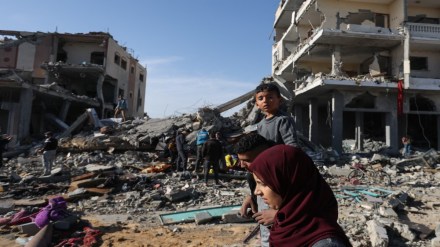As the conflict between Israel and Hezbollah escalates, global attention shifts north, leaving many Palestinians in Gaza fearful of being forgotten amid nearly a year of devastating war. Concerns grow that the international focus on their suffering is waning, raising the troubling prospect of abandonment.
Nezar Zaqout, one of the 1.9 million displaced Palestinians since the Israel-Hamas war erupted, expressed this sentiment. Now living in Khan Younis after fleeing Gaza City, Zaqout fears the fighting on the Israel-Lebanon border will eclipse efforts to address Gaza’s dire humanitarian conditions and cease-fire negotiations. “We have become completely forgotten,” Zaqout said. “There is no news about us in the media.”
Conditions in Gaza remain dire, with 90% of the population homeless, many living in unsanitary tent camps where access to food and clean water is scarce. “A year on, and no one cares about us,” said Saadi Abu Mustafa, a resident of Muwasi, a sprawling tent camp on Gaza’s southern coast. “Every day there is bombing, every day there are martyrs, and every day there are injuries.”
Since the war began on October 7, Israel’s retaliatory strikes have killed over 41,000 Palestinians and injured more than 95,000, according to Gaza’s Health Ministry. Entire neighbourhoods have been razed, and nearly 60 per cent of buildings in Gaza are estimated to have been damaged.
Israel’s response followed the October 7 Hamas attack, which killed around 1,200 Israelis and saw 250 others abducted. While Israel’s government claims it has crippled Hamas, the group remains in power with support from Iran. Israeli officials say around 70 of the 100 hostages taken are presumed alive. Their families worry that as Israel shifts focus to its northern border, the plight of the hostages will be overshadowed. “My biggest concern is that all the public’s attention will go to the north,” said Udi Goren, a relative of one of the victims taken to Gaza. “Eventually, the hostages will just be completely left alone.”
As the threat of full-scale war between Israel and Hezbollah grows, Israeli troops have redeployed from Gaza to the northern border, though thousands remain in the enclave to carry out raids and prevent displaced Palestinians from returning home. Daily airstrikes continue in Gaza, and an Israeli strike on a school-turned-shelter recently killed at least 22 people, mostly women and children.
In the Israeli-designated “safe zone” of Muwasi, recent rains have worsened living conditions, flooding tents and leaving children wading barefoot through ankle-deep mud. “The entire kitchen where we prepare food was filled with water,” said Rana Goza’t, displaced from Gaza City. “What will happen in the coming days as winter approaches?”
Efforts to broker a ceasefire between Israel and Hamas have largely stalled. Both sides accuse each other of negotiating in bad faith, and hopes for a deal have diminished as U.S. influence in the region appears to wane. Rebuilding Gaza is expected to take decades; the United Nations estimates that removing 40 million tons of rubble alone will take 15 years. Meanwhile, the people of Gaza and the families of Israeli hostages wait in uncertainty, fearing their suffering may be overlooked amid the broader regional conflict.
(With inputs from Associated Press)
